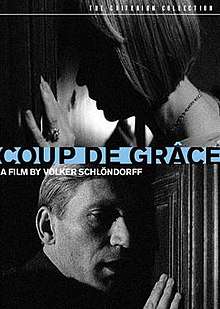Coup de Grâce (1976 film)
Coup de Grâce (German: Der Fangschuß, French: Le Coup de grâce) is a 1976 West German film directed by Volker Schlöndorff. Adapted from the novel Coup de Grâce by the French author Marguerite Yourcenar, the war film explores passion amid underlying political tones.[1] The title comes from the French expression, meaning "finishing blow".
| Coup de Grâce | |
|---|---|
 | |
| Directed by | Volker Schlöndorff |
| Produced by | Eberhard Junkersdorf Anatole Dauman |
| Screenplay by | Jutta Brückner Margarethe von Trotta Geneviève Dormann |
| Based on | Coup de Grâce by Marguerite Yourcenar |
| Starring | Margarethe von Trotta Matthias Habich Rüdiger Kirschstein |
| Music by | Stanley Myers |
| Cinematography | Igor Luther |
| Edited by | Jane Sperr |
| Distributed by | Cinema 5 Distributing |
Release date |
|
Running time | 97 minutes |
| Country | West Germany France |
| Language | German French |
Plot
In 1919 Latvia, a detachment of German Freikorps soldiers is stationed in a chateau in the town of Kratovice to fight Bolshevik guerrillas. The chateau is the home of the soldier Konrad von Reval and his sister Sophie von Reval. Sophie is attracted to another soldier, a close friend of Konrad's named Erich von Lhomond. However, the reticent Erich rebuffs her advances. In retaliation, Sophie has trysts with other members of the military troop. Erich is noticeably angered by her behavior. Eventually, Sophie learns that Erich and Konrad are lovers. After this discovery, she joins the leftist guerrillas, whom she had been in contact with previously. Erich's soldiers capture her and her comrades. Sophie asks that Erich execute her himself, and he obliges. In a striking single tracking shot, we see Erich casually shoot Sophie in the head before joining in a photo with the other soldiers. As all board a train, the camera pans back to the corpses of the executed.
Adaptation
The events of the novel, Marguerite Yourcenar's Coup de Grâce from 1939, are seen from the point of view of the soldier Erich von Lhomond. However, the film conveys the story from the viewpoint of Sophie von Reval, played by Margarethe von Trotta, who co-wrote the screenplay.[2] By directing the story from a female perspective, the film offers an alternate view, distorting the typical features of the war genre, such as a male perspective, and portrays the story through clashes of emotions and environments of the time that Sophie von Reval faces.[3] The filmmakers felt that an audience of 1976 would more readily identify with the independence and resolve exhibited by Sophie than with Erich's repressed conservatism.
In addition, the Russian Civil War is only a vague backdrop in the novel, but the film depicts battlefield engagements with a brutal reality that makes the war a significant presence.
Cast
- Matthias Habich as Erich von Lhomond
- Margarethe von Trotta as Sophie von Reval
- Rüdiger Kirschstein as Conrad von Reval
- Mathieu Carrière as Volkmar von Plessen
- Valeska Gert as Aunt Praskovia
- Marc Eyraud as Dr. Paul Rugen
- Bruno Thost as Chopin
- Henry van Lyck as Borschikoff
- Hannes Kaetner as Michel
- Franz Morak as Grigori Loew
- Frederik von Zichy as Franz von Aland
- Alexander von Eschwege as Blankenberg
- Maria Guttenbrunner as Mutter Loew
- Stephan Paryla as Sergeant
References
- "Coup de grâce". The Criterion Collection. Retrieved 2019-04-22..
- Barlow, Helen. "ALMOST EVERYTHING WE BELIEVED IN DID NOT REALLY SURVIVE". Goethe Institut. Retrieved 2019-04-22..
- Moeller, Hans-Bernhard; Lellis, George. "Coup de grâce". The Criterion Collection. Retrieved 2019-04-22..
External links
- Coup de Grâce at Rotten Tomatoes
- Coup de Grâce at AllMovie
- Coup de Grâce on IMDb
- Coup de grâce an essay by Hans-Bernhard Moeller and George Lellis at the Criterion Collection